28 May 2024 - {{hitsCtrl.values.hits}}
- On a given day, around a tonne (1000 kilograms) of garbage gets collected at Sri Pada
- Despite signboards indicating that anybody caught dumping garbage would be fined Rs. 5000, some devout pilgrims continue to litter the environment
- Environmentalists point out that imposing a surcharge on plastic usage and channeling the proceeds into conservation endeavours is a viable solution
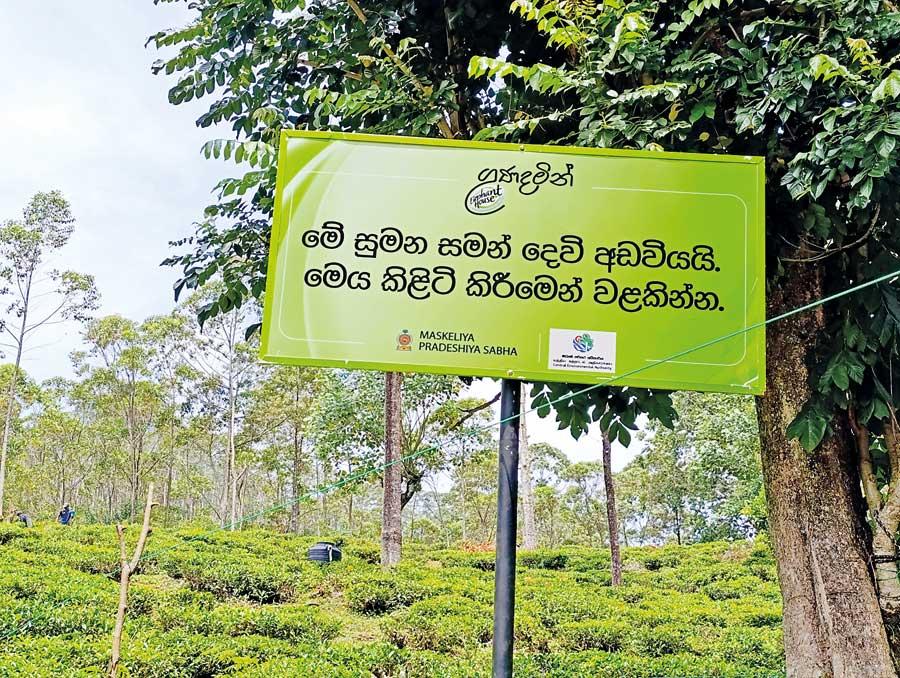
Signboards requesting devotees to keep Sri pada clean
Summiting the sacred Sri Pada or Adam’s Peak may sound like a fun adventure to many. This is exactly how this writer felt when she thought she would summit the Peak before the season concludes. But touring Sri Pada comes with a whole set of customs and traditions embedded in folklore. However, while in an attempt to climb somewhere towards the summit, the Daily Mirror also caught a glimpse of how volunteer groups are making an attempt to keep Sri Pada clean.
writer felt when she thought she would summit the Peak before the season concludes. But touring Sri Pada comes with a whole set of customs and traditions embedded in folklore. However, while in an attempt to climb somewhere towards the summit, the Daily Mirror also caught a glimpse of how volunteer groups are making an attempt to keep Sri Pada clean.
Customs and traditions
A first timer summiting Sri Pada is known as a ‘kodukaraya’ and there are many traditions that one should follow if he or she wants to have a safe journey to and fro. Unlike during the early days- when people would transfer the rights to all their properties and travel, mostly by foot, braving rocky terrains as opposed to the flight of stairs that pilgrims now use to reach its summit, there are special train and bus services for anybody who wishes to visit Sri Pada during the season. These bus services are often hired by groups of pilgrims (nada). Once pilgrims reach Nallathanniya there are temporary sheds put up on either side of the road for them to have a change, cook food and freshen themselves before summiting the peak.
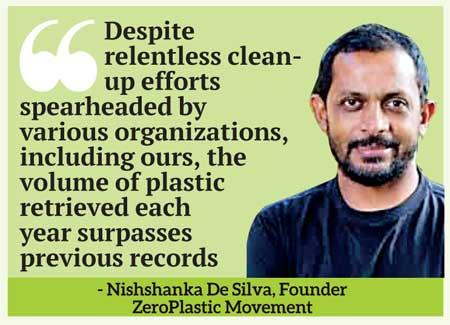 While we started our climb via the Hatton-Nallathanni trail, there are five other trails used by pilgrims to reach the summit. These include the Ratnapura-Palabaddala trail, Kuruwita-Erathna trail, Deraniyagala-Udamaliboda trail and the lesser-known Rajamale trail and the Dehenakanda-Mukku Watta trail. Some of these trails fall through the deep jungle and it is always advisable to have a guide or a villager if you’re the adventurous kind. It is customary for pilgrims to start their journey as midnight falls in order to catch a glimpse of the sunrise (Ira sewaya) while at the summit. Apart from paying homage to the sacred footprint of Gautama Buddha and/or Adam, people stand still at the summit to catch a glimpse of the sunrise.
While we started our climb via the Hatton-Nallathanni trail, there are five other trails used by pilgrims to reach the summit. These include the Ratnapura-Palabaddala trail, Kuruwita-Erathna trail, Deraniyagala-Udamaliboda trail and the lesser-known Rajamale trail and the Dehenakanda-Mukku Watta trail. Some of these trails fall through the deep jungle and it is always advisable to have a guide or a villager if you’re the adventurous kind. It is customary for pilgrims to start their journey as midnight falls in order to catch a glimpse of the sunrise (Ira sewaya) while at the summit. Apart from paying homage to the sacred footprint of Gautama Buddha and/or Adam, people stand still at the summit to catch a glimpse of the sunrise.
First timers are also expected to wash their face and feet or even have a bath at Seetha Gangula prior to reaching the summit. They are also expected to take with them a needle and thread (kodu packet) to be used at Indikatupana or Geththampana. It is a ritual to tie a string along the path to the top at this point. According to one folktale, when the Buddha arrived at this beautiful mountain on the invitation of Lord Sumana Saman, at one point the Buddha’s robes tore after getting caught to a rock splint (supposedly sent by evil spirits). When Lord Saman realised that the Buddha’s robes were torn, he offered to stitch them at this place and thereafter it was known as Indikatupana.
Indikatupana.
While on the way pilgrims can rest at the makeshift shelters (ambalama) by the side of the route and if you’re extremely thirsty, you could have a sip of coffee at The Last Coffee Shop which has a variety of food and beverages on a pricier range. Thereafter you will reach The Great Rock Climb or Maha Giri Damba which is a steep ascent prior to reaching the summit. When at Maha Giri Damba you could hear the chanting of pirith indicating that you’re getting closer to the summit.
Garbage issue
Sri Pada pilgrims would experience diverse weather patterns at Peak Wilderness, home to a sizeable population of Hill Country leopards. It was in Nallathanniya that the iconic black leopard was snared at a nearby estate in 2020. The landscape is also home to sambar, barking deer and many other endemic species. On one side, the picturesque Castlereigh Reservoir winds through vast expanses of tea estates and lush greeneries; providing breathtaking views of Sri Lanka’s Hill Country. When one observes the surroundings, they may not be convinced about the prevailing garbage crisis at Sri Pada. But the numbers speak for themselves.
On a given day, around a tonne (1000 kilograms) of garbage gets collected at Sri Pada. Around 25 tonnes of garbage had been collected over a period of five months until April this year. Despite signboards indicating that anybody caught dumping garbage would be fined Rs. 5000, some devout pilgrims continue to litter the environment.
Speaking to the Daily Mirror, a police officer at the Nallathanniya Police Environmental Division said that law enforcement officers have regular announcements for pilgrims to remind them that they have to take their own garbage home. “The fact that we have less volunteers makes this task more challenging than ever. But we have seen volunteer organizations supporting us in collecting garbage and attempting to keep this sacred site clean. There are enough and more dustbins along the route all the way up to the summit, but people would sometimes buy a small toffee and throw it’s wrapper on either side of the stairs, not knowing the consequences,” the Police officer said.
This newspaper observed how most private companies that have put up stalls along the way had setup their own dustbins to collect all the litter that accumulates. During our journey we met a few volunteers from the Leo Club of University of Kelaniya who were also carrying out a clean-up project titled Soba Siripa. “This is the second time we came for this project and we established a PET bottle bin, so that all plastic bottles could be thrown into it,” said Devini Liyana Gunawardhana, Director – Betterment of Leoism Unit. “What we observe is that people are more inclined to collect plastic items because they get paid for it, but other waste materials are overflowing from dustbins. It is the duty of every pilgrim to take back whatever they brought to this sacred site or dispose of them into dustbins that have been setup,” she added.
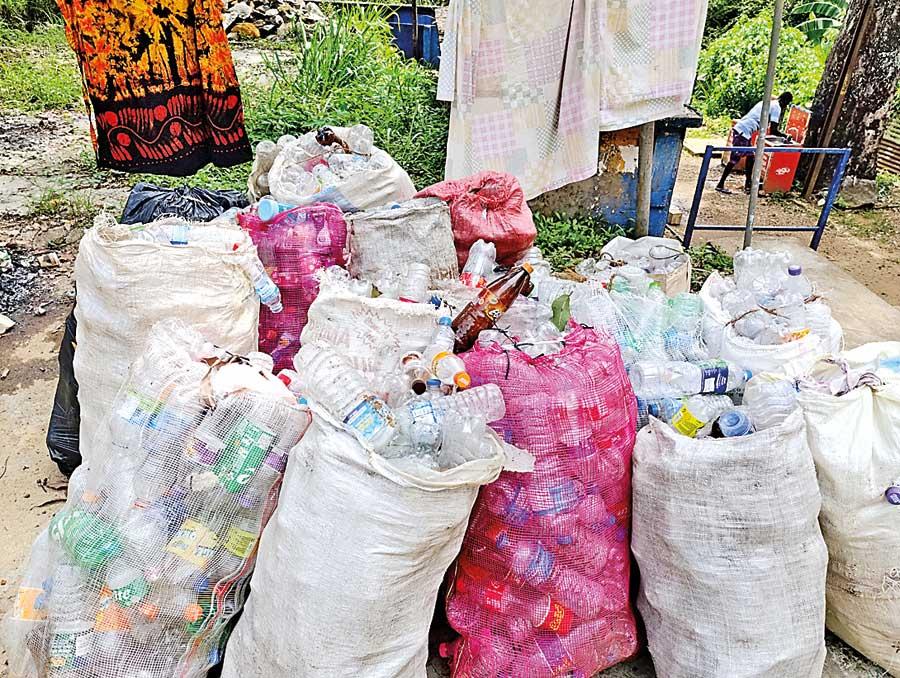
More plastics
“The plastic predicament demands urgent attention” – De Silva
The Maskeliya Pradeshiya Sabha collects garbage at the Sri Pada site, twice every week, but still there’s more garbage left. “The plastic predicament haunting Sri Pada’s pristine environment demands urgent attention,” warns Nishshanka De Silva, Founder - ZeroPlastic Movement. “The unchecked influx of plastic waste not only inflicts irreparable harm on the picturesque rivers originating from Sri Pada, but also poses a grave threat to biodiversity and wildlife,” said De Silva.
“Despite relentless clean-up efforts spearheaded by various organizations, including ours, the volume of plastic retrieved each year surpasses previous records. Numerous dialogues with the Central Environmental Authority have been fruitless, as multinational corporations continue to peddle plastic products and beverages to visitors, exacerbating the crisis,” said De Silva. De Silva advocates taking decisive measures; including a ban on plastic shopping bags and bottles at Sri Pada, alongside the provision of alternative water sources and stations along the pilgrimage route. Additionally, imposing a surcharge on plastic usage and channeling the proceeds into conservation endeavours is deemed to be a viable solution.
Emphasising the importance of visitor awareness and stringent regulations, De Silva further said that stakeholders should prioritise environmental stewardship over convenience. “Failure to act swiftly may cause irreparable harm to Sri Pada’s ecological heritage,” he underscored.
Many pilgrims fear certain customs embedded in folklore. Some believe that one should never say that the climb is too difficult as they would face some kind of challenge during attempts made to reach the summit. There are those who have experienced it first hand. This is also known as ‘kata waradda ganeema’ or deliberate loose talk which pilgrims believe invites trouble. Perhaps it should be made customary for people to take back their garbage. This way, it would be the responsibility of every pilgrim to take back his or her garbage, and perhaps it may even make devotees reluctant to even dump garbage in the dustbins!
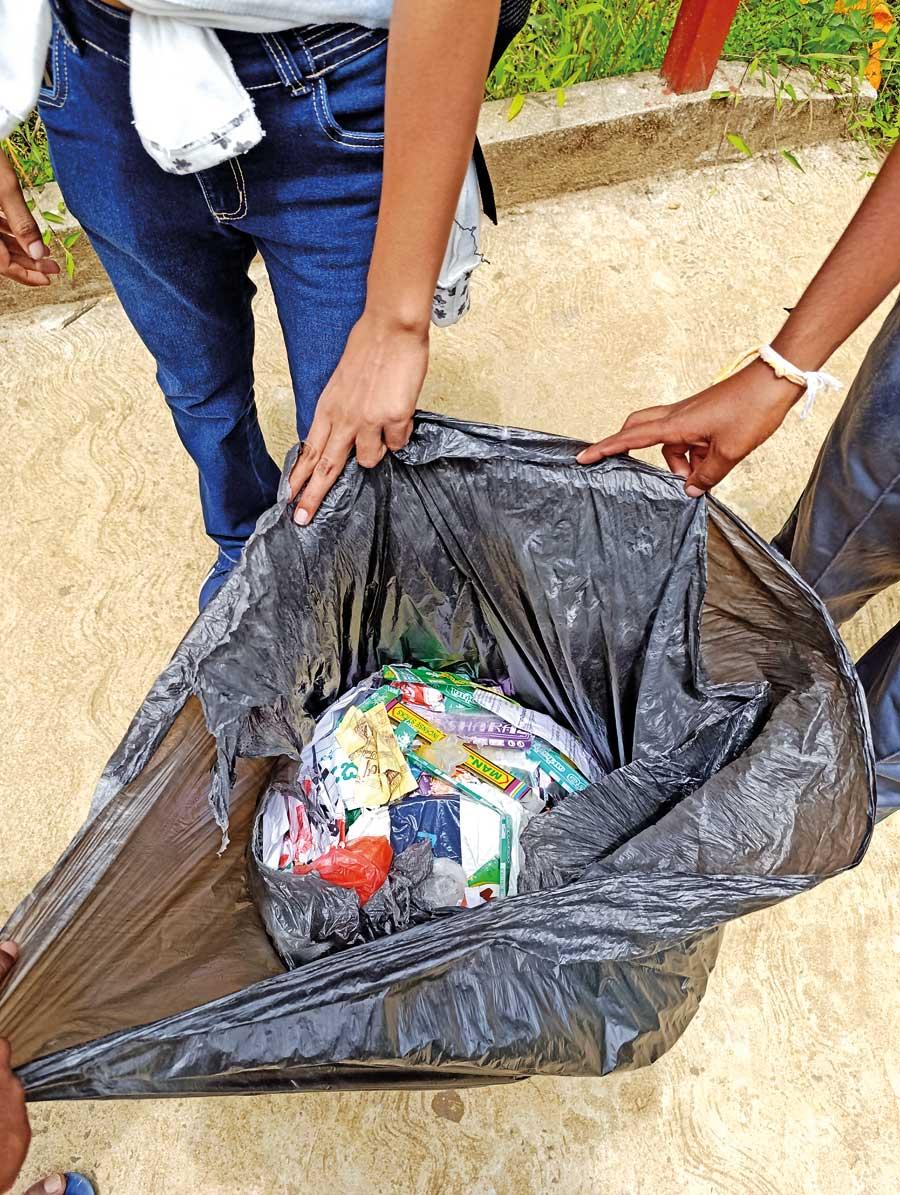
Garbage collected by volunteers
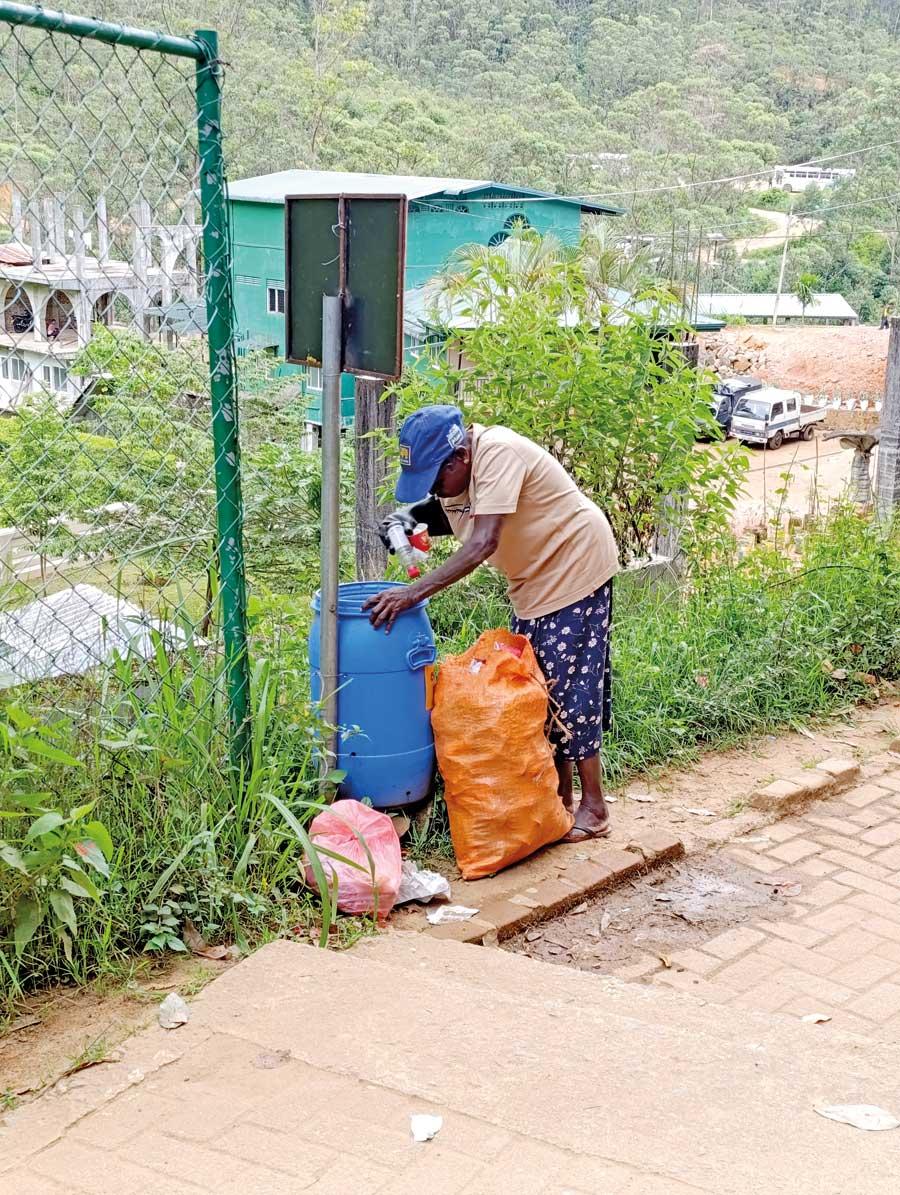
Separating plastics - A source of income for people
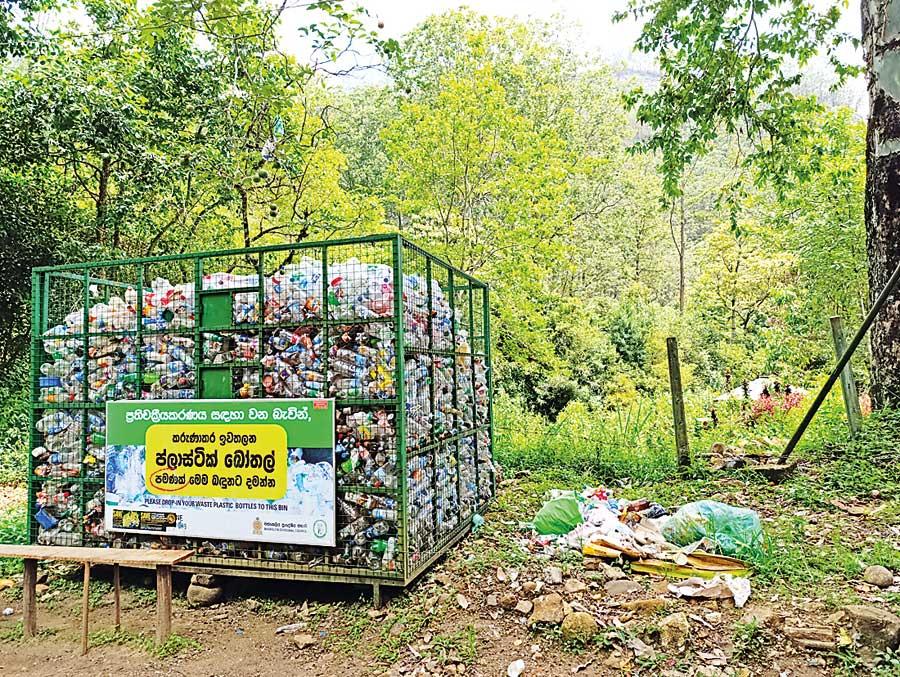
Dustbins filled to the brim
29 Dec 2024 19 minute ago
29 Dec 2024 1 hours ago
29 Dec 2024 3 hours ago
29 Dec 2024 3 hours ago
29 Dec 2024 3 hours ago